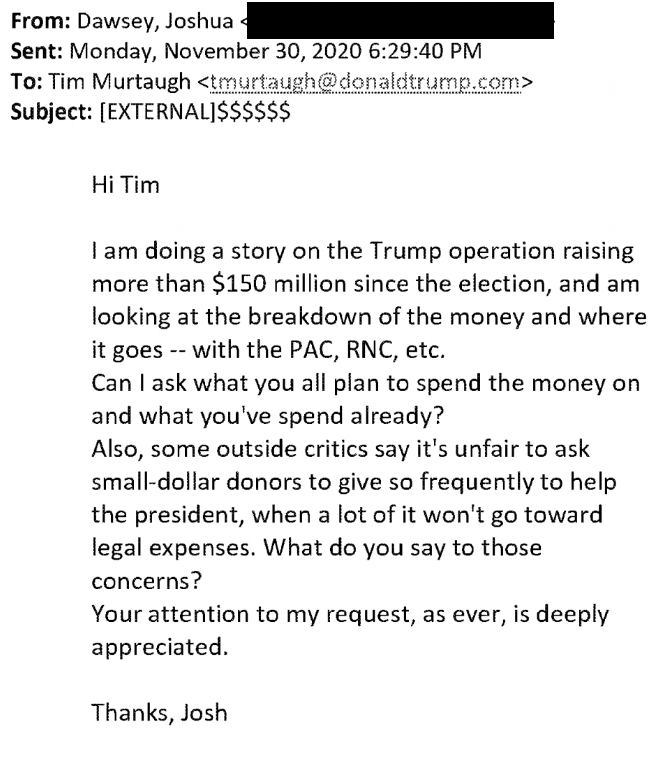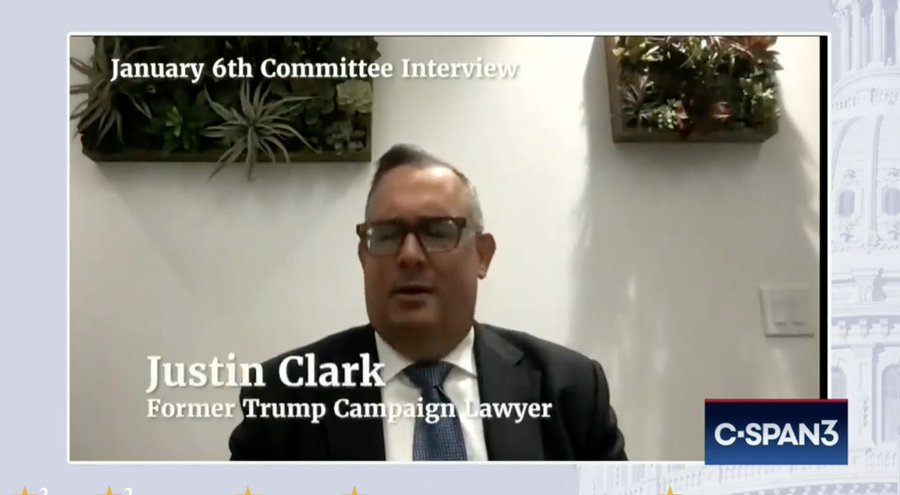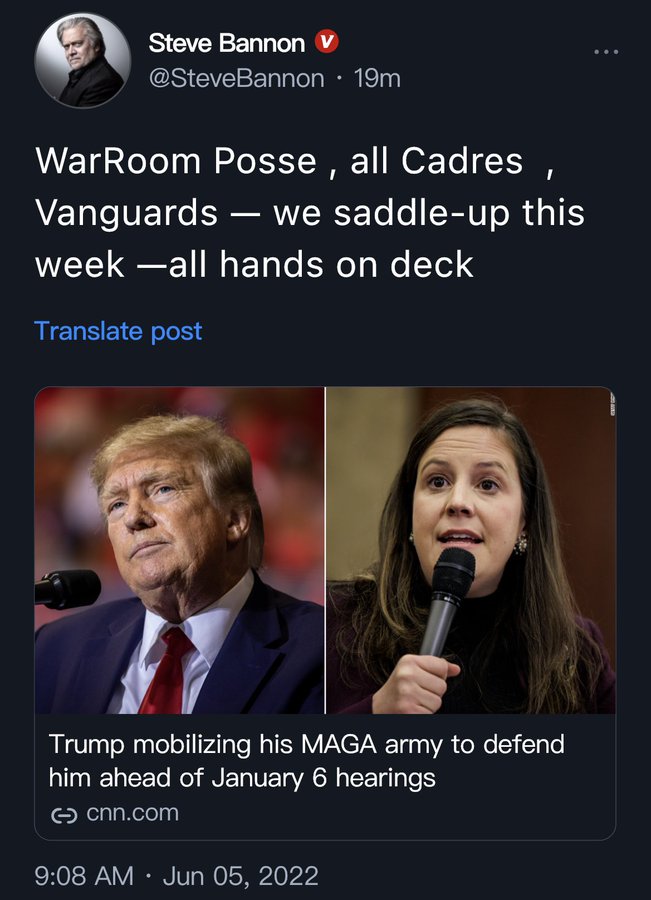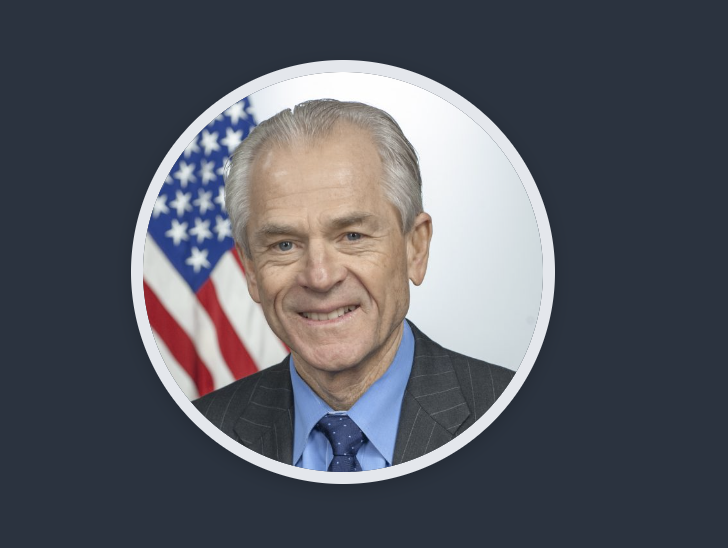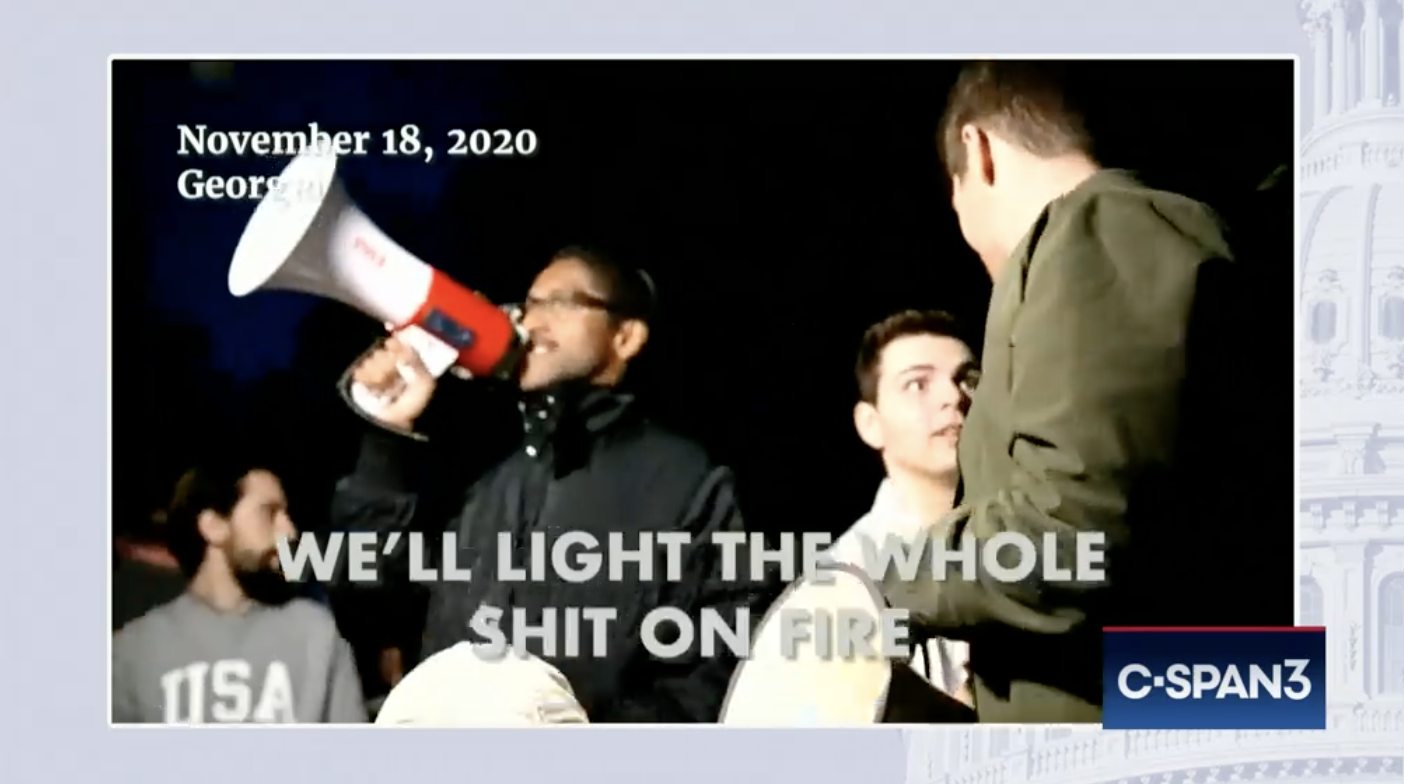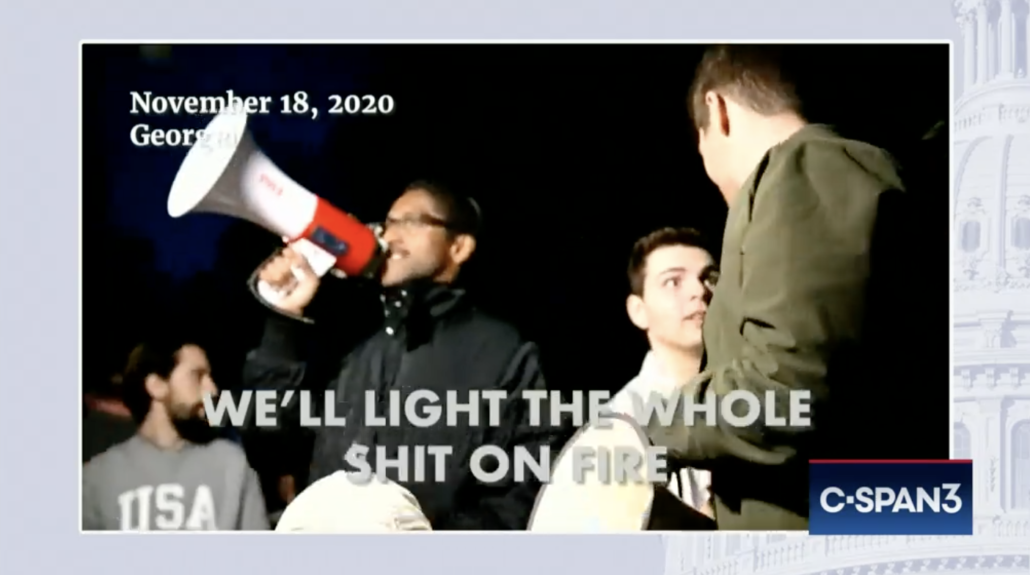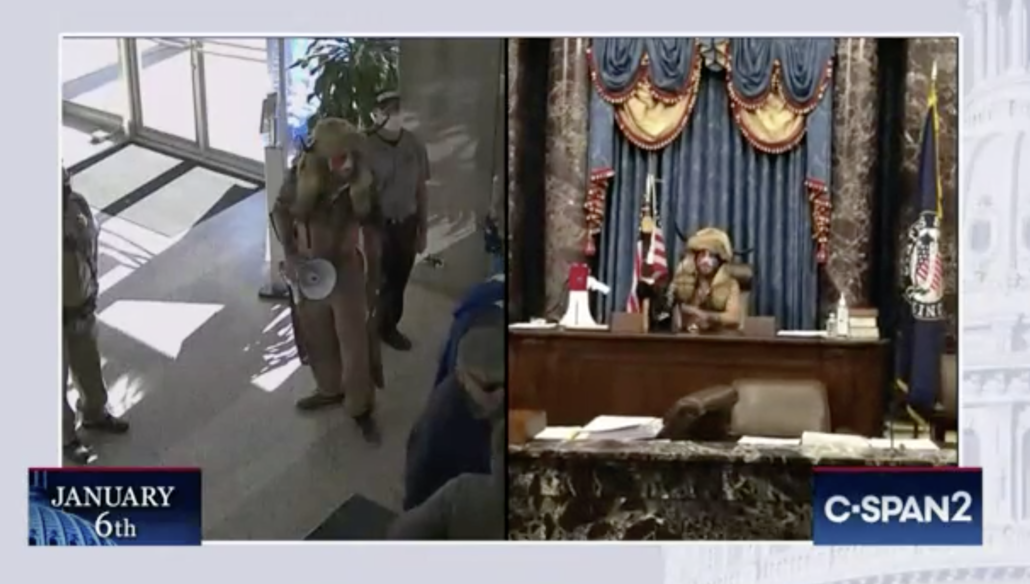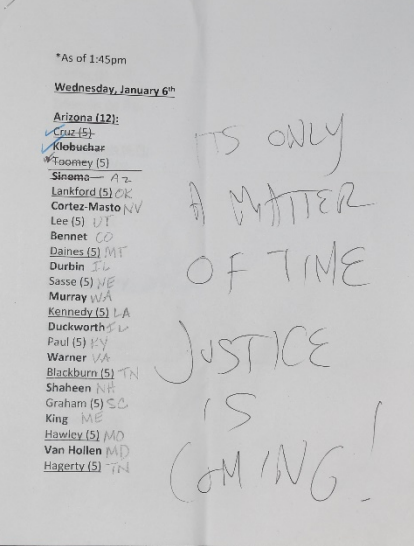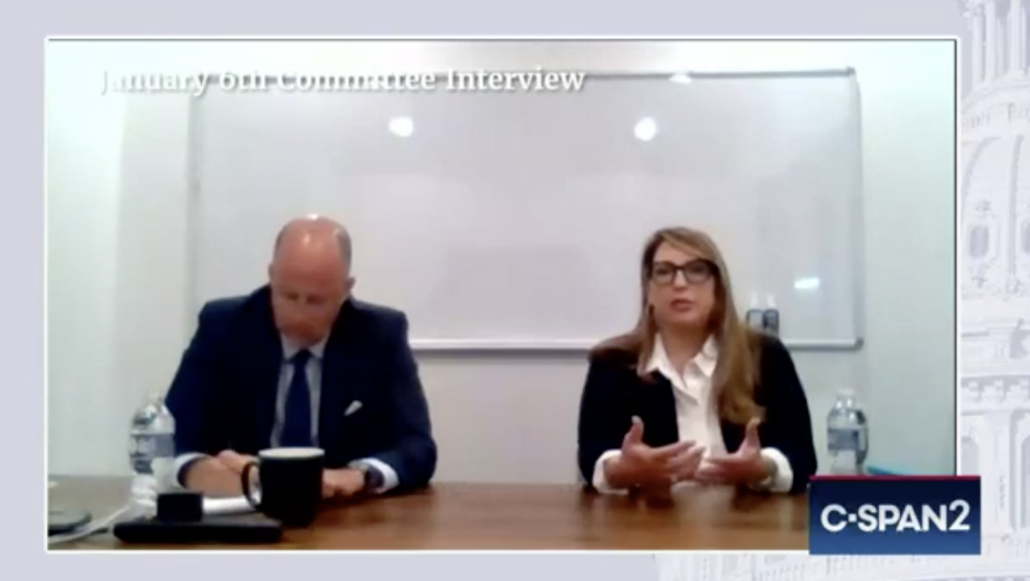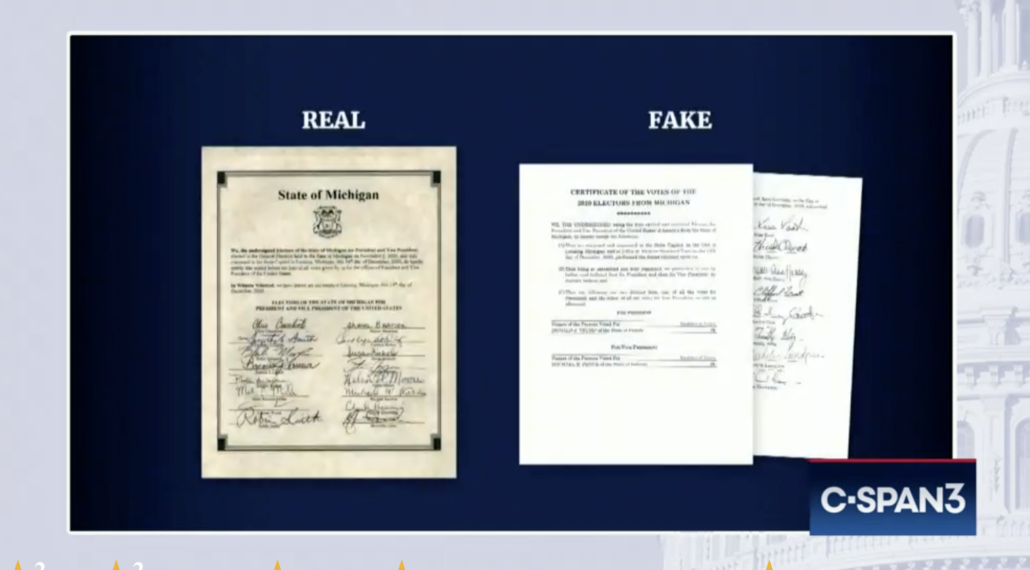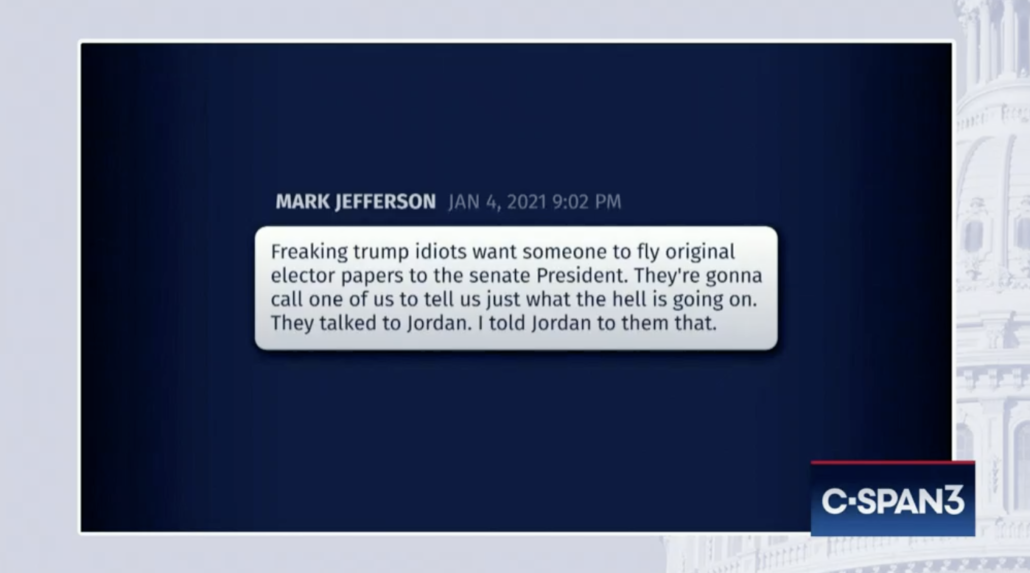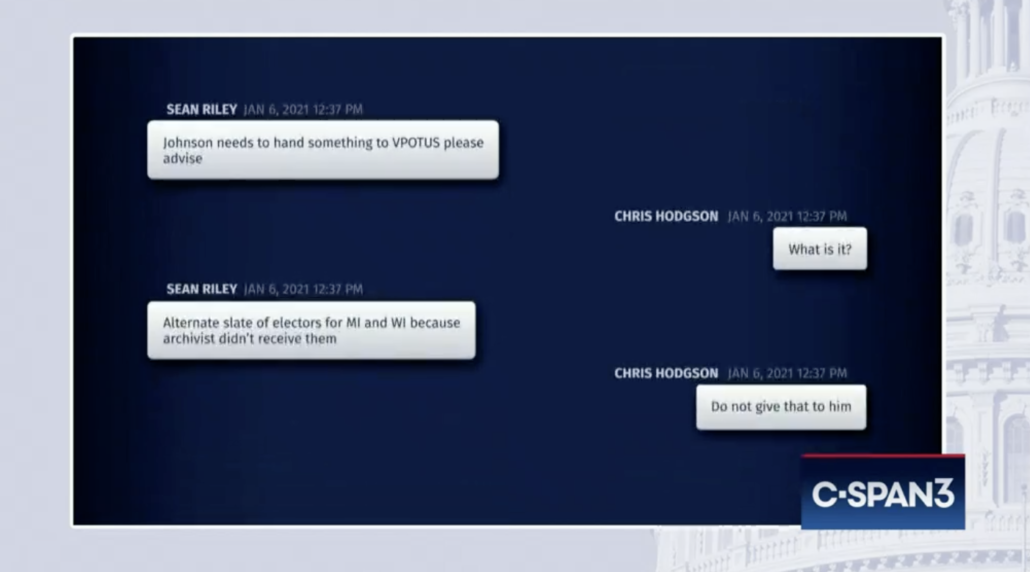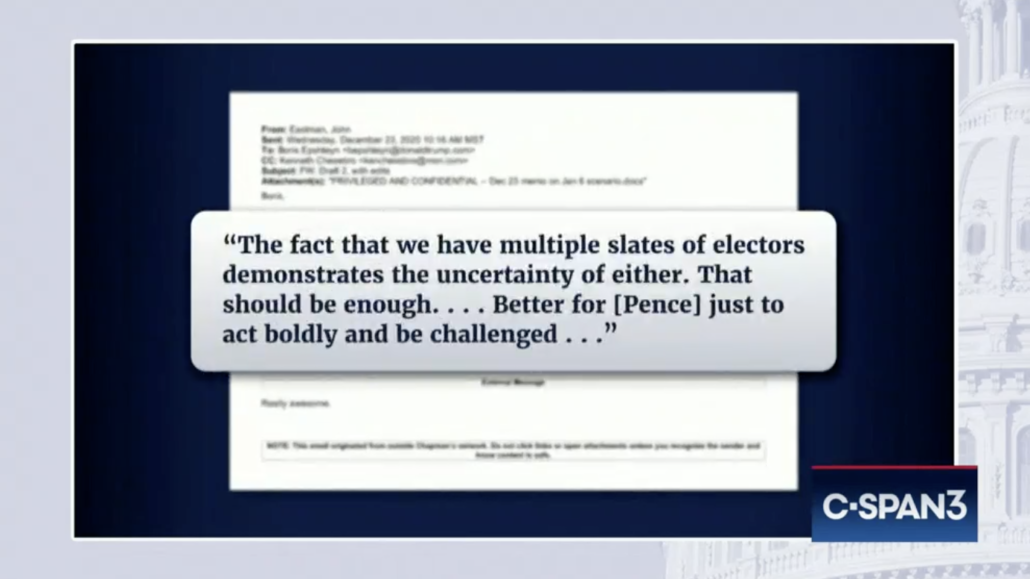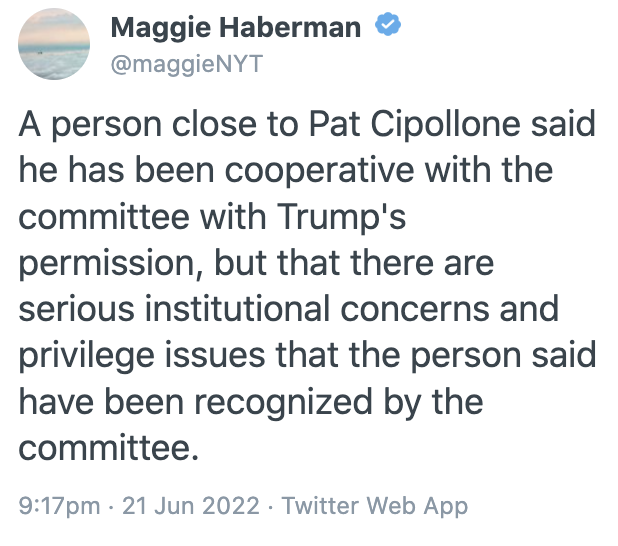“$$$$$$:” Josh Dawsey Comes Full Circle on Trump’s Fundraising Corruption
I’m going to share something I’ve been laughing to myself about for months, since before I wrote this post on how the financial aspect of Jack Smith’s investigation would be a way to break through the otherwise formidable wall of lawyer-witnesses between investigators and Trump’s crimes.
There’s a reason why the fundraising aspect of Trump’s Big Lie has been accessible to investigators, even beyond the fact that there’s boatloads of financial evidence available with a subpoena. That’s because reporters, including Josh Dawsey, were able to track Trump’s fundraising in real time back in 2020, and when they saw what he was doing, they asked the Director of Communications for Trump’s campaign, Tim Murtaugh, about it.
Heck, Dawsey even wrote a story on December 1, 2020, over a month before the Big Lie led to an insurrection, reporting on this scam.
President Trump’s political operation has raised more than $170 million since Election Day, using a blizzard of misleading appeals about the election to shatter fundraising records set during the campaign, according to people with knowledge of the contributions.
The influx of political donations is one reason that Trump and some allies are inclined to continue a legal onslaught and public relations blitz focused on baseless claims of election fraud, even as their attempts have repeatedly failed in court and as key states continue to certify wins for President-elect Joe Biden.
Much of the money raised since the election is likely to go into an account for the president to use on political activities after he leaves office, while some of the contributions will go toward what is left of the legal fight.
[snip]
The donations are purportedly being solicited for the Official Election Defense Fund, whose name is featured prominently atop the Trump campaign’s website.
There is no such account, however. The fundraising requests are being made by the Trump Make America Great Again Committee, a joint fundraising effort of the Trump campaign and the Republican National Committee. As of Nov. 18, that committee also shares its funds with Save America, a new leadership PAC that Trump set up in early November and that he can use to fund his activities after the presidency.
Dawsey appears to have gotten no response from Murtaugh.
What happened with his inquiry instead — along with one Politico’s Maggie Severns sent on November 11 and a follow-up question CNN’s Jeremy Diamond sent on November 24 — is that Murtaugh, who could have no conceivable attorney client privilege, sent the query to Justin Clark, who otherwise would have attorney-client privilege, along with a bunch of other senior campaign officials, to ask whether they should “still ignore” press inquiries about the fundraising.
In the case of Dawsey’s email, they said things like this to each other:
On Nov 30, 2020, at 7:03 PM, Tim Murtaugh <[email protected]> wrote:
I side with no comment. He’s going to write about the split and if we say stuff about legal expenses it will serve to highlight the argument that the fundraising pitch is misleading.
From: Jason Miller <[email protected]> Sent: Monday, November 30, 2020 7:24 PM
To: Tim Murtaugh <[email protected]> Cc: Sean Dollman <[email protected]>; Justin Clark <[email protected]>; Bill Stepien <[email protected]>
Subject: Re: [EXTERNAL]$$$$$$
Fair points. Sean -what are the reporting deadlines for these respective entities -12/15? It will be tougher to dodge such answers after reporters can find it themselves.
[snip]
Re: [EXTERNAL]$$$$$$
We should talk tomorrow about whether to just announce this by press release like we would any other fundraising announcement. If we have the numbers we can discuss how the breakdown among entities needs to be messaged. Also key, as Jason pointed out, that POTUS is on board with how it will be described. [my emphasis]
In response to Dawsey’s query back on November 30, 2020, Murtaugh, Clark, Jason Miller, CFO Sean Dollman, and Campaign Manager Bill Stepien exchanged emails recognizing that the fundraising pitch they were using was misleading, strategizing how they were going to continue to distract journalists from the misleading aspect of their pitches after they had to disclose their fundraising, and noting that they were going to ask Trump if he was comfortable with them fluffing journalists on how they were misleading small donors.
And Murtaugh, because he had no conceivable privilege in these exchanges, sent this exchange to the January 6 Committee and, I assume, to DOJ when they subpoenaed him.
That’s why I find it hilarious that Dawsey, in a report on a new set of subpoenas sent out in March that follow ones sent in December or November and September, wonders whether prosecutors will find the same kind of damning evidence that Trump’s campaign knew they were engaged in fraud as the Steve Bannon Build the Wall fraud did.
It’s unclear whether prosecutors will find similar kinds of evidence to support an indictment in this case.
I’m pretty sure they’ll find it, because that evidence has your name on it, Josh! One way Jack Smith will prove that Trump’s people knew they were lying to the rubes sending in their spare cash is by showing how panicked the campaign was when people like Dawsey started to ask about it.
WaPo suggests the subpoenas he describes disclose “the breadth of Smith’s investigation” and claims this prong of the investigation follows the release of the January 6 Committee Report.
The special counsel’s increased interest in fundraising follows the December release of the final report of the House select committee that investigated the Jan. 6 attack, which concluded that the Trump campaign and Republican National Committee’s joint fundraising operation brought in $250 million between the November election and Jan. 6, sending as many as 25 emails to supporters each day, many claiming that the election had been “rigged” or that Democrats had tried to steal the presidency and urging people to join the “Trump Army.” The Trump campaign sent several emails on Jan. 6 itself, including one declaring, “TODAY. This is our LAST CHANCE … The stakes have NEVER been higher. President Trump needs YOU to make a statement and publicly stand with him and FIGHT BACK.”
But not only have other outlets been reporting on it, CNN reported in December that this financial prong of the probe (which like NYT, they reported in September) had been going on, at that point, for a year, though the PAC prong of it may have post-dated the J6C presentation of this scam last June.
Another top prosecutor, JP Cooney, the former head of public corruption in the DC US Attorney’s Office, is overseeing a significant financial probe that Smith will take on. The probe includes examining the possible misuse of political contributions, according to some of the sources. The DC US Attorney’s Office, before the special counsel’s arrival, had examined potential financial crimes related to the January 6 riot, including possible money laundering and the support of rioters’ hotel stays and bus trips to Washington ahead of January 6.
In recent months, however, the financial investigation has sought information about Trump’s post-election Save America PAC and other funding of people who assisted Trump, according to subpoenas viewed by CNN. The financial investigation picked up steam as DOJ investigators enlisted cooperators months after the 2021 riot, one of the sources said.
That may be why Merrick Garland has been saying the investigation was following the money since October 2021, at which point the similar fraudulent fundraising investigation into Sidney Powell was reported by … the Washington Post.
The investigation into fundraising fraud is important by itself for the (outside) possibility it’ll lead Trump’s supporters to turn on him for cheating them. It could help to prove that Trump’s efforts to obstruct the vote certification on January 6 were “corrupt” by any definition of the term that the DC Circuit will ultimately adopt. But it likely also serves as a useful prosecutorial tool not just because it had a public-facing aspect that resulted in non-privileged conversations like the one above, but also because a goodly number of Trump people who weren’t implicated in the actual election theft were involved and cognizant of the financial fraud.

